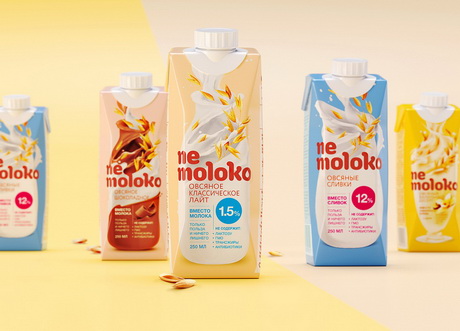
Sady Pridonya is the first company in Russia, which has launched mass production of plant milk, intends to take over 15% of the market from traditional dairy products.
At the end of 2016, a confidential meeting took place at the company’s HQ near Volgograd. Behind closed doors, the company’s President Andrei Samokhin, as well as its deputy production manager, chief technologist, marketing and financial chief officers discussed a new project. For almost 20 years, the company was dealing exclusively with juices and purees from fruits and vegetables. It was decided to produce plant milk from oats. “We were getting ready to launch a new category and to enter a new market of milk alternatives, bound to be copied,” Samokhin explained.
The next year was a difficult one: huge spending on equipment, thousands of liters wasted in search of perfect taste and color of the drink. In November 2017, the first 42.5 tons of an oat drink Nemoloko left the pipeline. In the spring of 2018, the novelty appeared in major retail chains — Auchan, Lenta, Doxy, Fix Price. Samokhin plans to compete with traditional dairy products. His company has already spent about €20 million, but the fruit tycoon does not intend to stop at this line.
The founder and head of one of Europe's largest processors of raw fruits and vegetables, Andrei Samokhin has always wanted to be the first on the market. “I am far from being happy with the third place,” he confessed to the Forbes five years ago. His company is distinguished from other market players by its own raw material base — approximately 8,000 hectares of apple, cherry and plum orchards, and vegetable fields. In 2017, Sady Pridonya produced 650 million pieces of finished products, but the company is still lagging behind the world's largest producers of soft drinks, Multon and PepsiSo. Data by the Russian Union of Juice Manufacturers show that Sady Pridonya occupies about 11.3% of the market.
The category of dairy alternatives is stipulated by several factors. Firstly, due to the crisis at the end of 2014, juice production in Russia fell by one third in 2015. Coca-Cola and PepsiSo shut down several plants, and buyers began to consume cheaper juice drinks. Sady Pridonya failed to notice any decline then, the company’s reporting shows a zero dynamics for juices in 2015. “We have not fallen, because there was room for development. We had room to grow,” Samokhin explained. From 2015, he has not abandoned any of the planned investment programs and even opened a new complex for processing of apples near Saratov.
Later Sady Pridonya marketed fruit and vegetable cocktails with cereals Easy Smoothie. “It is habitual to us to introduce something innovative every year — a packaging format, a new product, a piece of technological equipment,” said Irina Samokhina, Vice President for Strategic Development. In 2016, the company’s employees proposed to expand the assortment with “a couple of dairy alternatives”. It encouraged their superior to look beyond that: a separate market which did not exist in Russia, with the need to win it immediately.
“The market of dairy alternatives is very young in Russia (about 10 years) and it is highly dynamic. Compared to last year, it grew more than twice,” commented Tatiana Semina, Business Development Director, Danone Russia (Danone owns the world’s most famous brand of plant milk Alpro). This growth takes place amid declining sales of traditional dairy products. Nielsen calculated that 14 out of 16 product categories on Russia’s dairy market failed to show any growth in 2017. “There are fewer strong producers, more and more cases of adulteration with palm oil. This is a great opportunity for us to offer an alternative,” Samokhin concluded.


Comments (0)
Twitter
Facebook
Pinterest
E-mail